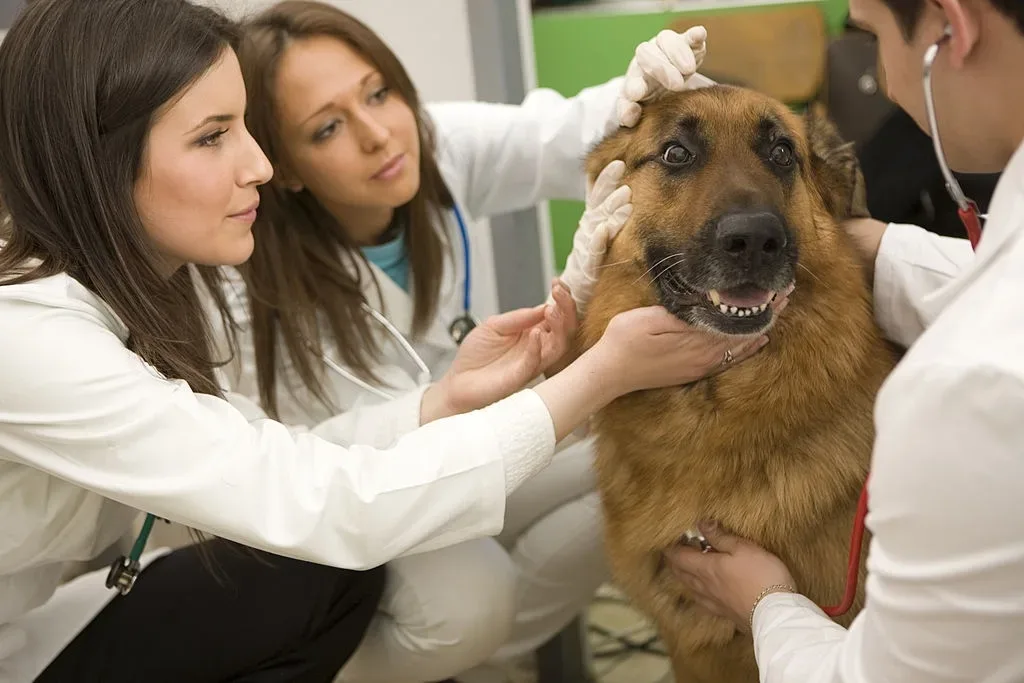Digestive Disorders in German Shepherd Dogs: German shepherds make excellent pets, but, unfortunately for themselves and their owners, they often suffer from health problems.
Table of Contents
Common of these are digestive problems and a sensitive stomach. These can range from mild to malignant, so it is important to keep an eye on your dog’s health and (even if it is gross) bowel movements.
Is it true that German Shepherds tend to have delicate digestive systems?
German Shepherds can indeed have sensitive stomachs, which means they may be more prone to digestive issues compared to some other dog breeds. It’s essential to be cautious about their diet to ensure their well-being. Below is a list of common food items that are not safe for German Shepherds:
| Food Items | Not Safe for German Shepherds |
|---|---|
| Chocolate | Grapes and raisins |
| Onions and garlic | Avocado |
| Alcohol | Xylitol (found in sugar-free gum) |
| Caffeine (coffee, tea) | Fatty foods |
| Bones (cooked) | Spices such as garlic and onion |
| Macadamia nuts | Dairy products |
| Artificial sweeteners | Raw eggs |
| Moldy foods | Salty snacks |
| Human medications | Sugary foods |
| Certain nuts (walnuts) | Alcohol |
Please remember that this list is not exhaustive, and some individual dogs may react differently to various foods. It’s essential to consult with your veterinarian before introducing any new food items to your German Shepherd’s diet. They can provide personalized advice based on your dog’s specific health needs.
If you have a German shepherd, you should consult your vet regularly about your dog’s diet. Depending on the problems it contains, you may need to adjust by eliminating certain types of food, adding supplements, or creating a raw food diet.
With care and attention, you will be able to control your dog’s stomach problems so that he can live happily and you don’t have to clean up a lot of mess.
Digestive Disorders in German Shepherd Dogs | Stomach and intestinal disorders are here
- Diarrhea
- Eosinophilic gastroenteritis
- Ulcer
- Exocrine pancreatic insufficiency (EPI)
- Toxic gut syndrome
1. Diarrhea in German shepherd Dogs
Diarrhea in German Shepherds can occur for a number of reasons, but is usually caused by food intolerance or parasites. If your dog has regular diarrhea, your first step is usually to check for parasites, as your vet can help treat you.

If there is no parasite, your dog will react negatively to anything in its diet. Foods like milk, fats, heavy fiber and whole grains can contribute to diarrhea. You will need to do a little trial and error to find out what helps your dog.
Other behavioral factors such as overeating and anxiety (or overeating) can also lead to diarrhea.
You should always make sure that you do not overfeed your dog, German Shepherds have a sensitive stomach and diarrhea can get diarrhea quickly.
So, make sure that you are not feeding your dog too much and that you are offering moderate exercise regularly to reduce stress. Do not do intense exercise immediately after eating.
Many hereditary conditions can cause recurrent vomiting, diarrhea or weight loss in your Shepard. These conditions include pancreatic or intestinal disease, food sensitivity and food allergies.
Some of these problems may start very early stage of your dog’s life.
To help prevent these conditions, feed only high-quality pets (we can help you choose the right food) and, most importantly, avoid snacks and table food.
Feasts that are high in fat, sodium or artificial foods (such as people’s diet) are especially bad for your friend’s digestion.
The health care chart included in this care guide lists the specific digestive disorders your pet may be experiencing.
2. Eosinophilic gastroenteritis in German Shepherds
Eosinophilic gastroenteritis is an inflammation of your dog’s intestines and stomach.
Chronic diarrhea, especially watery diarrhea, can be a sign of this disorder. Other symptoms include vomiting, loss of appetite, and weight loss.
You should be able to diagnose the problem using your wet stool sample. Eosinophilic gastroenteritis can be treated with steroids or other using drugs that line up the digestive system and help reduce inflammation.
Inflammatory bowel disease, a group of disorders that cause inflammation of the gastrointestinal tract, can cause similar symptoms and should also be treated by your veterinarian.
3. Ulcers in German shepherd Dogs
German shepherds suffer from ulcers, which are related to other digestive problems, as a result of medication for other problems (such as pain medications for hip dysplasia).
An ulcer is a sore throat that results from a rupture of the lining of the stomach or intestines.
It can cause your dog pain and can cause loss of appetite, weight loss, vomiting (sometimes including blood), bloody stools, weakness and anemia.
Often, ulcer treatment requires treatment for the underlying condition. Your vet will need treatment to bring your dog’s fluid levels back to normal.
4. Exocrine pancreatic insufficiency
Exocrine pancreatic insufficiency would arise when your dog’s pancreas lose the capacity to produce enough digestive enzymes by itself.
Their digestive system needs those enzymes to break down protein, fat and carbs. If a puppy has EPI, it may not be able to absorb nutrients into foods.
This means that even if it eats the right food, it can become malnourished and starve to death if not treated properly.

If your dog has EPI, you may notice that he is always hungry and is losing weight despite eating normally.
They can also eat uneaten items, including poops in general. Dogs with EPI often have high amounts of fart and can often poop. Their stools can take on a runny nose and turn yellow.
EPI can be diagnosed with a blood test. Because it is so dangerous, it is important to test your pooch whenever you have a chronic digestive problem, especially if you are starting to lose weight.
Your vet can help you treat EPI with a special diet, enzyme and vitamin supplements, and antibiotics.
5. Toxic gut syndrome in German Shepherds
Toxic gut syndrome is less common than other digestive health problems, but it is more common in German shepherds than in other dog breeds. It is important to be aware of this syndrome because it is often fatal and can kill very quickly.
German shepherds naturally carry a type of intestinal bacterium called Clostridium. Under certain conditions, these bacteria can reproduce in large numbers, entering the dog’s bloodstream and creating a toxic effect.
Sadly, when this happens, the dog usually dies within a few hours. Since Toxic Gut Syndrome kills so quickly, it is important to prevent it.
Some vets recommend a yogurt-based supplement that can help control the levels of bacteria in your dog’s intestines.
You should talk to your vet about the best plan for the prevention of Toxic Gut Syndrome.
Prevention of stomach problems in German Shepherd dogs
There are a few things you can do to prevent your dog from developing any of these conditions.
The most common and simplest way to do this is to make sure your dog is eating the right food for it.
To make sure your dog is not in danger because of stomach problems, you know you are getting quality food.
Also Read: The 3 Best Dog Foods for Shedding Control
In fact, you need to make sure you get a good mix of protein, fat and carbohydrates. For a shepherd, this equates to about 20% of its calories from protein and 5% from fat (subtracting 2% if you feed the puppy.)
However, more important than the breakdown of nutrients is the quality ingredients and specific ingredients used. Try to go gluten-free or at least fewer grains.
The Best Food we recommend, especially when your dogs faces any stomach problem is given below.
In terms of protein, you want to make sure you choose a high-quality protein source. Good protein sources for shepherds come from whole meats such as beef, fish and other organ meats.
Chicken is not the best food for shepherds because most foods made with chicken come with by-products, which is not good for anyone, especially not the shepherd with a sensitive stomach.
In terms of fat, make sure you get your diet with high-quality fat sources.
Omega-3 fatty acids are the best, and you can get a diet rich in omega-3s or you can choose a diet that uses fish as its main protein source as fish are rich sources of omega-3 fatty acids.
FAQs
Do German Shepherds frequently experience digestive problems?
Yes, German Shepherds can be prone to digestive issues due to their sensitive stomachs and unique dietary needs. To improve their digestion, it’s essential to feed them a high-quality, easily digestible diet that suits their individual preferences and sensitivities.
What steps can I take to enhance my German Shepherd’s digestive health?
To boost your German Shepherd’s digestion, consider feeding them smaller, frequent meals, ensuring they have access to fresh water at all times, and incorporating high-fiber foods like vegetables and grains into their diet. Additionally, consult with your veterinarian for specific dietary recommendations tailored to your dog’s needs.
What are the seven most prevalent digestive issues in dogs?
Common dog digestive issues include diarrhea, vomiting, constipation, bloating, food allergies or intolerances, gastroenteritis, and pancreatitis. These conditions may vary in severity, so it’s crucial to consult your vet for an accurate diagnosis and appropriate treatment.
How can I recognize if my dog is experiencing digestive problems?
Signs of digestive problems in dogs can include diarrhea, vomiting, changes in appetite, lethargy, abdominal discomfort, and excessive gas. If your dog displays these symptoms consistently or if you have concerns about their digestion, consult your veterinarian for a thorough evaluation.
What steps can I take to address and improve my dog’s digestive system?
To address your dog’s digestive system issues, start by adjusting their diet to one that agrees with their stomach. Gradually transition to new foods, avoiding known triggers. Consult your vet for guidance, and consider probiotics or digestive enzyme supplements to promote a healthy gut. Ensure your dog stays hydrated and gets regular exercise to aid digestion.
How can I help my dog clear their digestive system?
To assist your dog in clearing their digestive system, you can try a brief period of fasting (under veterinary guidance) followed by a bland diet consisting of boiled rice and lean meat. This can help reset their digestive tract. Always consult with your vet before making dietary changes, especially if your dog’s digestive issues persist.
Final Words
In conclusion, understanding and addressing digestive disorders in German Shepherd dogs is of paramount importance to ensure their overall health and well-being. These majestic canines, known for their intelligence and loyalty, can be susceptible to specific gastrointestinal issues. By recognizing the signs and symptoms, implementing appropriate dietary changes, and seeking timely veterinary care, we can effectively manage and even prevent these digestive disorders in German Shepherd dogs.
Remember, a balanced and tailored approach to their diet, regular check-ups with a veterinarian, and a commitment to their specific needs are the keys to keeping our beloved German Shepherds healthy and happy. In the journey of caring for our four-legged companions, knowledge and vigilance regarding digestive disorders in German Shepherd Dogs are invaluable for providing them with the best possible life quality.

